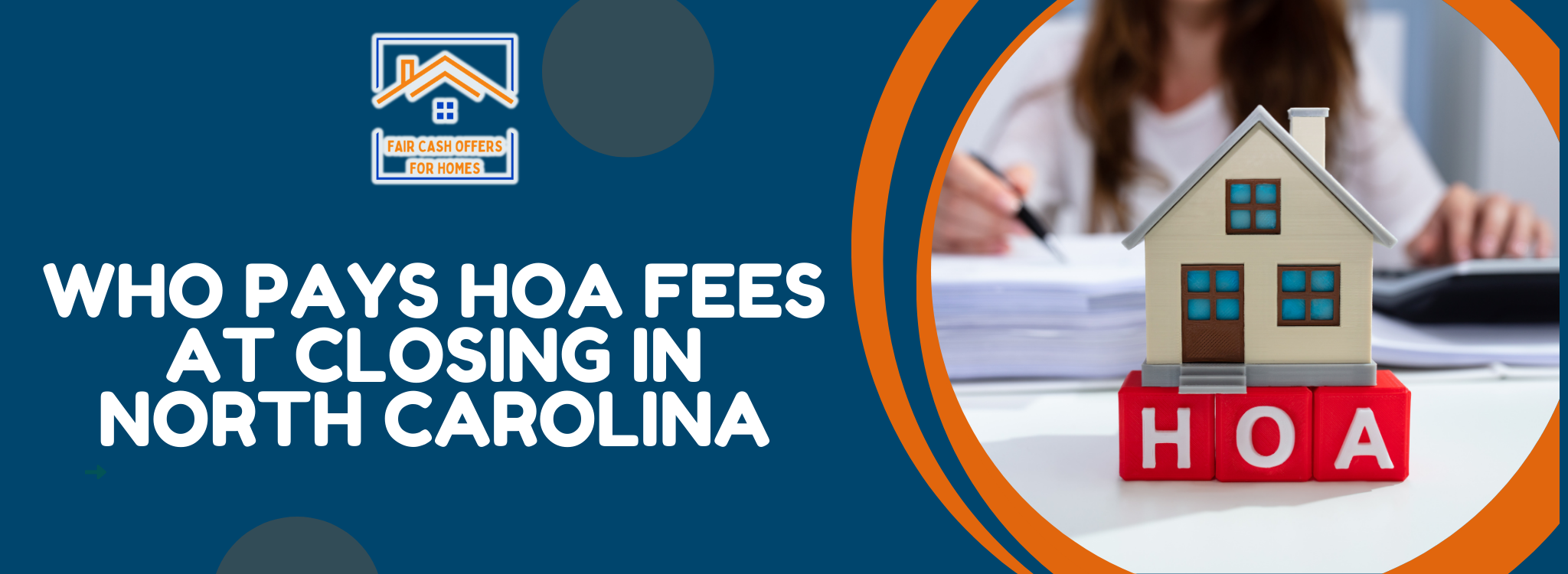
Overview of HOA Fees at Closing in North Carolina
What are homeowners association (HOA) fees?

Homeowners Association (HOA) fees, dues, or costs are regular payments that property owners make to maintain their membership in an HOA. These fees support community amenities, manage common area expenses, and maintain the quality of life within the community. In a real estate transaction in North Carolina, these fees are a legal obligation that buyers and sellers must address.
How do HOA fees impact real estate transactions in North Carolina?
In North Carolina, HOA fees significantly affect real estate transactions. These costs affect the ultimate settlement between the buyer and the seller at closing. The proration of HOA fees is a major determinant, as the closing date usually determines payment responsibility. Negotiations might also cover whether assessments will be passed to the new owner or the seller will pay off any past-due obligations. Understanding how these fees fit into closing costs helps ensure both parties meet their community obligations responsibly.
Key terms related to HOA fees: dues, assessment, and transfer fee.
Understanding HOA fee terminology is important in a North Carolina property transaction:
Dues: Homeowners make regular payments to fund shared amenities and services.
Assessment: This is a specific charge by the HOA for major repairs or unexpected expenses that surpass the usual budget.
Transfer Fee: This fee applies when property ownership changes hands, covering administrative costs for updating HOA records.
Each of these components adds to a transaction’s financial responsibilities. It is important for all parties to clearly understand these implications and handle disclosure and payment conditions properly.
Responsibilities for Paying HOA Fees at Closing

Who typically pays the HOA fees during a home sale in North Carolina?
Homeowners Association (HOA) costs during a house sale can fall under different North Carolina duties. Often, this depends on state legislation and the provisions of the closing agreement. Depending on the purchase agreement, negotiations influence both the buyer’s and the seller’s expenses. While sellers handle any payable up to the closing date, buyers often pay future HOA costs after closing. Both sides should discuss these obligations early in the negotiation process and be aware of local rules.
Are there any state laws or agreements affecting responsibility for HOA fees?
North Carolina’s laws can significantly impact who pays HOA fees in a real estate transaction. State regulations and legal agreements often specify which party is responsible for closing. According to state disclosure rules, sellers must provide buyers with details about any outstanding HOA obligations. Buyers should review these disclosures carefully to understand their financial responsibilities. Consulting a real estate attorney or an experienced agent familiar with North Carolina law can help clarify these responsibilities.
What factors influence whether the buyer or seller covers HOA costs?
In North Carolina, several elements might affect the split in HOA payments between the buyer and seller. Important aspects comprise the purchase agreement’s provisions, bargaining dynamics, and handling of appropriate proration. Proration splits HOA fees based on how many days each party holds the property during the billing cycle when the sale takes place. Sometimes, the buyer manages payments after talks produce the seller covering all costs until closing. Knowing these elements helps both sides come to a just compromise.
Processes Involved in HOA Fee Settlement
How are HOA fees calculated and prorated at closing?

In a real estate transaction that involves homeowners associations, it’s important to understand how HOA fees are calculated and prorated. Usually, depending on the community’s budget, these fees are distributed among property owners. These fees must be prorated at closing to match each party’s liability period. Proration guarantees that the buyer and the seller pay just portions of the expenses. This means modifying the closing statement depending on the days each party possesses the property during the billing cycle. All concerned parties should review the HOA fees in the closing statement for correct proration.
What is the role of the community management company in the fee settlement process?
The community management company plays an essential role in settling HOA fees. This property management entity oversees the accuracy and collection of fees from community residents. During a real estate transaction, the community management company ensures all outstanding fees are settled and correctly reflected in the closing documents. They also provide important information about pending dues or responsibilities affecting the ownership transfer. Their involvement is key to ensuring a smooth transition and accurate financial settlements within the community.
How does proration affect closing statements and final costs?
The last expenses shown on closing statements are largely influenced by proration. Prorated expenses such as property taxes, insurance, and HOA fees divide themselves between the buyer and seller, depending on their respective ownership times. This influences the distribution of closing costs, guaranteeing that everyone pays the appropriate expenses. Specific proration rules in North Carolina assist in establishing settlements using equitable cost allocation among engaged parties. Knowing these changes helps sellers and buyers control expectations and prevent conflicts.
Negotiating HOA Fees in Real Estate Transactions
What strategies can buyers use to negotiate HOA fees with sellers?

Buyers seek ways to reduce financial obligations in real estate transactions, particularly in North Carolina. Negotiating Homeowners Association (HOA) fees is a key approach. Buyers should start by asking how these fees are calculated and what they cover. This understanding helps form a basis for negotiation. By discussing the proration of dues at closing, buyers can ensure that fees are fairly split based on when they take possession of the property. Clearly defining buyer responsibilities for HOA fees in the purchase agreement also prevents future disputes over who owes any outstanding balances.
How can sellers prepare for potential negotiations on HOA fees?
Sellers in North Carolina should be ready for negotiations concerning HOA fees as part of their closing costs. To prepare, sellers must understand their HOA fee obligations and ensure all dues are paid before listing their property. Being informed and having documentation ready strengthens their position in negotiations. Sellers should also be open to discussing how closing costs will be shared, including paying a portion of upcoming HOA fees to smooth the transaction. Good preparation allows sellers to present clearly what they are willing to negotiate, facilitating a more efficient closing process.
What common pitfalls should be avoided when discussing HOA fee responsibilities?
Avoid common mistakes when discussing HOA fee responsibilities in real estate transactions. In North Carolina, it’s important to document clear agreements on who pays what portion of the HOA fees at closing. A frequent error is failing to include these details in the closing statement, which can cause disputes later. Ensuring all relevant obligations are met and confirming both parties understand the division of HOA costs can prevent confusion. Buyers and sellers should verify any changes in HOA policies or dues before finalizing the deal.
Legal Considerations and Compliance in North Carolina
What legal documents concerning HOA fees should be reviewed?

Reviewing specific legal documents regarding homeowners association (HOA) fees in North Carolina real estate transactions is crucial. These documents typically include the HOA’s declaration, bylaws, and financial statements. Checking these materials thoroughly ensures compliance with state guidelines and helps clarify any current or future fee obligations. Accurately reviewing these documents helps prevent misunderstandings about fee assessments and financial duties.
How do North Carolina laws influence the disclosure of HOA fees?
North Carolina state laws require full disclosure of all HOA fee-related information during property transactions. Sellers must provide potential buyers with a detailed list of ongoing and expected fees. Understanding these legal regulations is important for both parties to avoid disputes and promote transparency in the transaction. Familiarity with these laws aids compliance and clarifies one’s rights and responsibilities within an HOA-governed property.
What are the consequences of non-compliance with HOA fee obligations?
Ignoring HOA fee obligations in North Carolina can lead to serious legal consequences. Homeowners association rules demand regular fee payments, and failure to comply can result in penalties, property liens, or legal action. Homeowners must recognize their responsibility for compliance and address any late payments to avoid legal issues. This awareness highlights the importance of maintaining good standing within the homeowners association.
This information applies to North Carolina and its cities, including Burlington, Fayetteville, and Greenville. For assistance or questions, please call us at (919) 551-8506 . You can also visit our website at Fair Cash Offers For Homes for more details.
FAQs:
What fees are buyers typically responsible for during a home closing in North Carolina?
Buyers in North Carolina usually cover most settlement costs, such as appraisal, attorney, and lender fees. HOA dues and transfer fees are often negotiated with the seller.
Who typically pays HOA fees at closing?
HOA fee responsibility at closing can be negotiated. Buyers might cover these costs, but sellers often handle prorated HOA dues until closing.
Are there any specific fees unique to North Carolina home sales?
Yes, North Carolina requires compliance with the North Carolina Planned Community Act, ensuring clear title, and may include transfer fees linked to HOA management.
What are some common costs besides HOA fees that sellers might cover?
Sellers might pay for realtor commissions, repairs agreed upon after a home inspection, and sometimes a portion of the closing costs to assist with the sale.
How do transfer fees work in North Carolina’s housing transactions?
Transfer fees, imposed by the homeowner’s association, often relate to changes in property ownership. These fees are negotiable and should be clearly stated in the purchase agreement.
Can HOA dues vary based on location within North Carolina?
Yes, HOA dues can differ based on the community’s size, amenities, and management practices. Review the HOA’s financial records for clarity.
What are some legal aspects to consider with homeowner associations in NC?
Understanding the North Carolina Planned Community Act is crucial, as it governs many HOA operations, including dues, rules enforcement, and dispute resolution.
How should buyers approach negotiations regarding closing fees?
Buyers should consult with realtors and attorneys to understand potential costs and negotiate terms like paid closing costs, appraisal fees, and responsibility for specific expenses to ensure a fair deal.
Key Insights
- In North Carolina, buyers typically cover most settlement costs, including owner’s association fees and transfer fees specified in their agreements.
- Sellers and the listing agent often negotiate who pays HOA fees at closing. Depending on the contract, the buyer may be responsible.
- Charges like closing fees and appraisal costs in NC should be clearly outlined in documents reviewed before closing.
- HOA dues, also known as homeowner’s association fees, can be prorated during a home sale according to state laws and the North Carolina Planned Community Act.
- Buyers should communicate with community management companies to understand any outstanding obligations or reasonable fees for the property or its amenities.
- Knowing who covers closing costs in North Carolina is crucial, as this varies by agreement and might include fees for appraisers and attorneys.
- Realtors can offer guidance on specific state laws and regulations regarding HOA fees and the necessary transfer fees in closing transactions.
- Understanding fees paid at closing ensures both parties meet their financial obligations and that all funds are properly allocated and documented.
More Resources For Sellers In North Carolina


